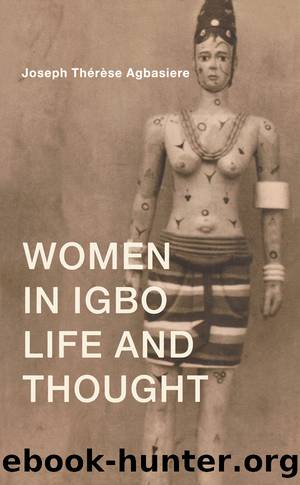Women in Igbo Life and Thought by Joseph Therese Agbasiere

Author:Joseph Therese Agbasiere [Agbasiere, Joseph Therese]
Language: eng
Format: epub
Tags: Social Science, Anthropology, General
ISBN: 9781136358937
Google: uJpACwAAQBAJ
Publisher: Routledge
Published: 2015-12-22T05:06:03+00:00
Notes
1 This is a view shared by the late Professor D. I. Nwoga and Dr P. A. Nwachukwu of the Department of Linguistics and Nigerian Languages, University of Nigeria, Nsukka.
2 Edwin Ardener (1959) re-affirms the main arguments in the earlier works (i.e. E. W. Ardener 1954a, b) through consideration of the structure of Nguru community in Mba-Ise.
3 Umunne, umunna (singular nwanne, nwanna, respectively). See Table 4.
4 Cf. E. W. Ardener (1959: 113-14).
5 Classificatory terminology is defined as one in which lineal relatives (father, son, etc.) are addressed or spoken of by terms which may apply to certain collateral relatives (Notes and Queries, Vol. 23(4), p. 77).
6 This can be translated as nwa ada nna (collectively umuada nna = umuada) and nwa okpara nna (collectively umuokpara nna = umunna), respectively. The elder female or male child of a single mother within a polygamous set up may be referred to as nwa ada nne, âelder female child of motherâ or as nwa okpara nne, âelder male child of motherâ, as distinct from the eldest female or male child of a polygamous group taken as a single unit, who would be described as isiada nna, literally âhead of fatherâs elder daughtersâ or diokpara nna, literally âhusband of fatherâs elder sons = heir apparentâ, respectively.
7 Literally meaning âfatherâs childâ as opposed to âmotherâs childâ (nwanne). The term reflects the logical linguistics complement of nwanne. In ordinary usage neither this term nor its collective umunna carries the meaning attached to it by Igbo ethnographers.
8 Derives from the same root as okwu (word of mouth) and is generally used to refer to a (fitting) cover or match, implying close identity. For example, ikwu efere, ikwu ite, âsimilar typeâ, in the sense of fitting lid or cover of a dish or pot respectively. The term implies close identity and the notion of beauty and completeness.
9 Ottenberg (1968) describes the kinship system of Afikpo in terms of double descent, from which it is inferred that the rest of the countryâs kinship system is unilineal. A more recent work, Nsugbe (1974), speaks of another Igbo group, Ohaffia, in terms of matrilineal descent, which implies that the rest of Igboland operates on the patrilineal descent system. But, further research might yet prove that the Afikpo and Ohofia systems are at one end of a continuum.
10 Readers should understand âpaternal half-siblingsâ here, as the Igbo do not practise polyandry, and both illegitimacy and re-marriage of women are extremely rare.
11 Ndebe is derived from the terms nde, âpeople ofâ and be, âhomeâ. In its semantic context ndebe denotes member of the immediate family under a single male head. The word nde is commonly used in combination with other terms to designate a separate and purposeful group. For example, nde oha ala, literally âpeople who worship Ala (traditionalists)â as distinct from nde uka, âpeople of the church (Christians)â.
12 Nkpuko seems to be derived from two root terms: nkpu (low entrance) and uko (part of the kitchen, overhanging the hearth).
13 Used in its very restricted sense of localized blood relatives.
Download
This site does not store any files on its server. We only index and link to content provided by other sites. Please contact the content providers to delete copyright contents if any and email us, we'll remove relevant links or contents immediately.
| Africa | Americas |
| Arctic & Antarctica | Asia |
| Australia & Oceania | Europe |
| Middle East | Russia |
| United States | World |
| Ancient Civilizations | Military |
| Historical Study & Educational Resources |
Machine Learning at Scale with H2O by Gregory Keys | David Whiting(4313)
Never by Ken Follett(3957)
Fairy Tale by Stephen King(3399)
Oathbringer (The Stormlight Archive, Book 3) by Brandon Sanderson(3216)
The Man Who Died Twice by Richard Osman(3080)
Will by Will Smith(2920)
Rationality by Steven Pinker(2366)
Can't Hurt Me: Master Your Mind and Defy the Odds - Clean Edition by David Goggins(2342)
The Dark Hours by Michael Connelly(2311)
Friends, Lovers, and the Big Terrible Thing by Matthew Perry(2230)
The Dawn of Everything: A New History of Humanity by David Graeber & David Wengrow(2210)
Principles for Dealing With the Changing World Order: Why Nations Succeed and Fail by Ray Dalio(2055)
A Short History of War by Jeremy Black(1848)
HBR's 10 Must Reads 2022 by Harvard Business Review(1845)
Go Tell the Bees That I Am Gone by Diana Gabaldon(1758)
A Game of Thrones (The Illustrated Edition) by George R. R. Martin(1746)
Kingdom of Ash by Maas Sarah J(1683)
515945210 by Unknown(1668)
443319537 by Unknown(1560)
